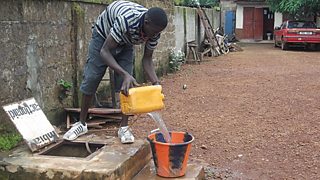Breaking the silence: cholera in Sierra Leone
Alpha Kamara
Content Researcher and Producer, Βι¶ΉΤΌΕΔ Media Action in Sierra Leone
Tagged with:

A young man gets water from a chlorinated water well in Kambia, Sierra Leone
Βι¶ΉΤΌΕΔ Media Action is currently helping radio stations across Sierra Leone with their response to the cholera outbreak, in terms of reporting and providing critical information.
The cholera outbreak in Sierra Leone made international headlines over the weekend when the president declared a national emergency. Since January, more than 200 people have died.
The district of Kambia on the country's northern border was one of the first places to suffer from the outbreak. In April and May, hundreds of people were affected and five died.
Back then, I spoke to Pa Alie Turay from Bamoi, a market centre that attracts people from all over the country, and even neighbouring Guinea. He told me: "We are dying from cholera because the water we drink here is from water wells and streams that are not protected. Our fear is for our children who roam about with little or no protection. We want the media to help us because the health personnel are not taking this issue seriously."
As a station mentor, I suggested that cholera was an issue that Radio Kolenten, the community radio station, should be covering. I helped the journalists gather information and we approached the District Health Management Team.
At first we faced reluctance. "Whenever cholera is discussed, the people will be scared," Health Superintendent Dr Jalloh told us. However, after a lengthy discussion, he agreed to be interviewed.
On air, he said, "We are running out of drugs because of the daily admission of cases. In fact, we had to administer 30 doses of intravenous fluids to one patient who was in a very desperate condition. But unfortunately, the council says there is no health allocation from central government since the start of the year. So we are in dire need of help."
The local radio programme Leh Wi Tok – 'Let’s Talk' in Krio - broadcast on the outbreak in Kambia, covering the causes of the disease, and asking what the Ministry of Health was doing to respond. The programme, which aims to give local people a voice and hold authorities to account, broke the silence around the outbreak and there was a dramatic response.
Red Cross volunteers embarked on a door to door sensitisation on the causes of cholera and how it can be treated. A local community based organisation that works on children's welfare chlorinated over 100 water wells. And Health Alert, a health advocacy organisation, lobbied the authorities to act fast and save lives.
Above all, the Kambia District Council summoned an emergency meeting to find ways of combating the outbreak and finally disbursed funds for drugs to treat patients.
Within a week the frequency of cholera cases fell, and District Medical Officer, Dr Tom Sesay, thanked the media for what he called the "timely intervention" that forced the Council to release funds to combat the outbreak. "Now we have enough to respond to any other emergency," he added.
Five months later, the outbreak is nationwide and the response by the media, the government and donors is growing. Kambia is faring better while other areas are suffering, partly thanks to the radio station's coverage of the outbreak early on.
Covering the outbreak didn't cause panic as the authorities feared. The station was able to give people access to lifesaving information, and this continues through a daily jingle produced by the radio staff on cholera prevention. Not only that, but the station helped to hold the authorities to account and encouraged them to find money to tackle the outbreak. In many parts of Sierra Leone, the population relies almost completely on radio for news and information. Radio Kolenten really lived up to the title of community radio by covering the outbreak and breaking the deadly silence around it.
Related links
Elsewhere on Βι¶ΉΤΌΕΔ Media Action:
From Βι¶ΉΤΌΕΔ News:
